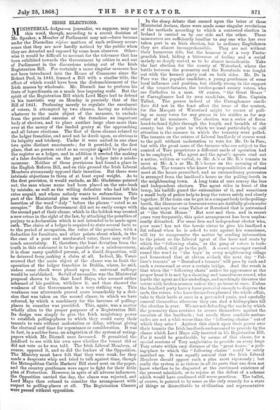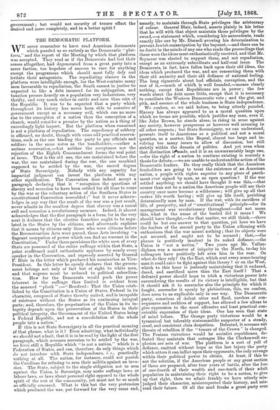IRISH ELECTIONS.
tSTERIAL dodges—a journalist, we suppose, may use his word, though, according to a recent decision of Mr. Speaker, a Member of Parliament may not—have become under the Disraelian regime matters of such ordinary occur- rence that they are now hardly noticed by the public when they are detected and exposed by some keen observer. Other- wise it would be difficult to account for the tolerance that has been exhibited towards the Government by critics in and out of Parliament in the discussions arising out of the Irish Registration Bill. For certainly a more singular measure has not been introduced into the House of Commons since Sir Robert Peel, in 1841, framed a Bill with a similar title, the effect of which would have been the disfranchisement of the Irish masses by wholesale. Mr. Disraeli has to perform his feats of legerdemain on a much less imposing scale. But the spirit of the Registration Bill which Lord Mayo had to defend in his inartistic way on Monday is precisely that of the Bill of 1841. Professing merely to regulate the enrolment of voters, it attempted by two clauses, having no relation whatever to the main object of the measure, to exclude from the practical exercise of the franchise an important body of electors, and to place another large class more than ever at the mercy of the landed gentry at the approaching and all future elections. The first of these clauses related to the lodger franchise, and need not be dwelt upon, so obvious is its iniquity and trickery. Under it were united in one class two quite distinct enactments ; for it provided, in the first place, that no person rated as an occupier should be placed on the register as a lodger, and in addition it erected the making of a false declaration on the part of a lodger into a misde- meanour. Neither of these provisions had found a place in the English Reform Bill, and on this ground the Irish Liberal Members strenuously opposed their insertion. But there were intrinsic objections to them of at least equal weight. As to the first provision, it would exclude, as Mr. Gladstone pointed out, the man whose name had been placed on the rate-book by mistake, as well as the willing defaulter who had left his rates unpaid, and whom nobody wants to enfranchise. This part of the Ministerial plan was rendered innocuous by the insertion of the word " duly " before the phrase " rated as an occupier." But the Government did not so easily escape with the second part of their clause, which in the boldest way created a new crime in the sight of the law, by attaching the penalties of perjury to a declaration which is not intended to be made upon oath. The claim of a lodger is required to state several facts as to the period of occupation, the value of the premises, with a deduction for furniture, and other points about which, in the the case of a poor and uneducated voter, there may well be much uncertainty. If, therefore, the least deviation from the truth in this statement is to be punished as a misdemeanour, it is clear many qualified persons, of a timid disposition, will be deterred from making a claim at all. Indeed, Mr. Vance avowed that the main object of the clause was to limit the operation of the lodger franchise in Dublin, where, he said, unless some check were placed upon it, universal suffrage would be established. So full of anomalies was the Ministerial proposal shown to be, that Lord Mayo, who seemed rather ashamed of his position, withdrew it, and thus showed the weakness of the Government in a very striking way. This weakness was afterwards proved more remarkably by a divi- sion that was taken on the second clause, to which we have referred, by which a machinery for the increase of polling- places in counties was provided. This, again, was a matter wholly alien to the proper purposes of a Registration Bill. Its design was simply to give the Irish magistracy power to establish polling-places to which they could carry their tenants to vote without molestation or delay, without giving the electoral serf time for repentance or consideration. It was in fact, in a milder form, an adaptation of the system of voting- papers which Mr. Disraeli once favoured. It permitted the landlord to see with his own eyes whether the tenant did or did not vote as he was told. The Irish Liberal Members, of course, opposed it, and so did the leaders of the Opposition. The Ministry must have felt that they were weak, for they made a desperate whip and tried to talk against time, though the Metropolitan Cattle Markets' Bill stood next on the paper, and the country gentlemen were eager to fight for their little plan of Protection. However, in spite of all adverse influences, the Opposition carried the day, the clause was rejected, and Lord Mayo then refused to consider the arrangement with respect to polling-places at all. The Registration Clauses were passed without opposition. In the sharp debate that ensued upon the latter of these Ministerial devices, there were made some singular revelations of the methods according to which a contested election in Ireland is carried on by one side and the other. These manoeuvres are sufficiently familiar to any one who has ever taken part in an Irish election, but to ordinary Englishmen they are almost incomprehensible. They are not without their humorous side, but the humour is of a very Pante- gruelish kind, hiding a bitterness of feeling and a social malady so deeply seated as to be almost ineradicable. Take the last election for the county of Waterford, where the battle between the peasantry and the Beresfords was fought out with the keenest party zeal on both sides. Mr. De la Poer was the popular candidate, a young gentleman of sonic local influence and position, but chiefly strong in the support of the tenant-farmers, the twelve-pound county voters, who are Catholics to a man. Of course, "the Great House " at Curraghmore had its own candidate, the Hon. Captain Talbot. The person indeed of the Curraghmore candi- date did not in the least affect the issue of the contest, for the Marquis of Waterford might ba secure of poll- ing as many votes for any groom in his stables as for any other of his nominees. The election was a series of fierce hand-to-hand fights through the length and breadth of the county, but the point to which we want particularly to call attention is the manner in which the tenantry were polled. The tenants on the estates of Liberal landlords of course went to the poll without molestation to vote for Mr. Do la Poer, but with the great mass of the farmers who are subject to the control of Tory proprietors a different mode of operation had to be employed, The agent and the agent's agents send out a notice, written or verbal, to Mr. A.'s or Mr. B.'s tenants to meet at Mr. A.'s or Mr. B.'s house on the morning of the election. The tenants who know the responsibilities of refusal meet at the hours prescribed, and an extraordinary procession is arranged from the landlord's house to the polling-booth in the neighbouring town. A long train of cars convey the free and independent electors. The agent rides in front of the troop, his bailiffs guard the extremities of it, and sometimes a small body of police help to keep the voters safely and closely together. If the train can be got in a compactbody to thepolling- booth, the threescore or fourscore votes are dutifully given under the agent's eye for some Talbot or Beresford that is patronized at " the Great House." But now and then, and in recent years very frequently, this quiet arrangement has been unplea- santly disturbed. For some free and independent elector who, poor man 1 has not the heroic virtue to give his landlord a flat refusal when he is asked to vote against his conscience, will try to compromise the matter by sending information to the priest or the Liberal agent of the hour and route by which the " following chain," as the gang of voters is tech- nically called, will go to the poll. A smart messenger carried round the word to the boys" in every neighbouring village and homestead that at eleven o'clock the next day " Pal- liser's tenants" or " Beresford's tenants" will pass by such and such a cross-road or over a certain bridge. And the result is that when the " following chain" makes its appearance at the proper hour it is met by a shouting and tumultuous crowd, who hustle the agent and his underlings, and mockingly threaten the voters with broken sconces unless they go home at once. Unless the landlord party have a force powerful enough to disperse the mob, the voters, who have themselves planned the whole affair, take te their heels at once in a pretended panic, and carefully conceal themselves wherever they can find a hiding-place till the election is over. We are not defending the mode by which the peasantry thus contrive to secure themselves against the coercion of the landlords ; but surely these roadside ambus- cades are not a whit worse than the " following chains " out of which they arise ? Against this check upon their power over their tenants the Irish landlords endeavoured to provide by the clause which Lord Mayo slily inserted in his Registration Bill. For it would be practicable, by means of this clause, for a special sessions of Tory magistrates to provide on every largo Tory estate within easy distance of the " great house," a poll- ing-place to which the " following chains " could be safely marched up. It was equally natural that the Irish Liberal Members should oppose such a plan most vigorously ; but really the system is so vicious in all its parts that one does not know whether to be disgusted at the continued existence of the present mischiefs, or to rejoice at the defeat of a scheme which would have confirmed still worse practices. The ballot, of course, is pointed to by some as the only remedy for a state of things so discreditable to civilization and representative government ; but would not security of tenure effect the desired end more completely, and in a better spirit ?































 Previous page
Previous page